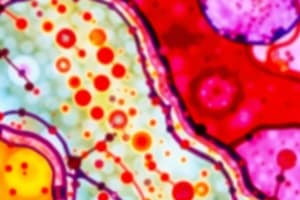Podcast
Questions and Answers
Explain the process of differentiation in cell lines and provide an example of irreversible differentiation.
Explain the process of differentiation in cell lines and provide an example of irreversible differentiation.
Differentiation in cell lines is the process by which less specialized cells develop or mature to become more distinct in form and function. An example of irreversible differentiation is the cessation of DNA synthesis in the erythroblast nucleus, neuron, or mature keratinocyte.
Give an example of reversible differentiation and explain the concept.
Give an example of reversible differentiation and explain the concept.
An example of reversible differentiation is the dedifferentiation of mature hepatocytes into precursors during liver regeneration. Reversible differentiation refers to the process where mature cells revert back to precursor cells.
What are the three basic categories of cells that make up the mammalian body?
What are the three basic categories of cells that make up the mammalian body?
The three basic categories of cells that make up the mammalian body are germ cells, somatic cells, and stem cells.
What is differentiation and how is it related to the expression of phenotypic properties in cells?
What is differentiation and how is it related to the expression of phenotypic properties in cells?
Define constitutive and adaptive properties found in mature cells.
Define constitutive and adaptive properties found in mature cells.
Flashcards
Cell Differentiation
Cell Differentiation
The process by which less specialized cells mature into more distinct forms and functions.
Reversible Differentiation
Reversible Differentiation
The process of cells reverting back to precursor cells.
Irreversible Differentiation
Irreversible Differentiation
Mature cells becoming permanently specialized and losing the ability to divide.
Constitutive Properties
Constitutive Properties
Signup and view all the flashcards
Adaptive Properties
Adaptive Properties
Signup and view all the flashcards
Study Notes
Cell Line Differentiation
- Differentiation refers to the process enabling cells to acquire distinct phenotypic properties, leading to functionally mature cells in vivo.
- Involves the maturation of less specialized cells to adopt specific forms and functions, enhancing cellular specialization.
- Can be irreversible, as seen when DNA synthesis halts in various cell types like erythroblasts, neurons, or mature keratinocytes.
- May exhibit reversibility, exemplified by dedifferentiation of mature hepatocytes back to precursor cells during liver regeneration.
Characteristics of Mature Cells
- Differentiation integrates both constitutive properties (stably expressed without need for induction) and adaptive properties (regulated by environmental factors).
- Three primary categories of cells exist in mammalian organisms:
- Germ cells: involved in reproduction.
- Somatic cells: make up the body, performing various functions.
- Stem cells: possess the ability to differentiate into various cell types.
Cell Population in Humans
- An adult human comprises approximately 37.2 trillion cells (3.72 x 10^13), each exhibiting unique differentiation states.
Studying That Suits You
Use AI to generate personalized quizzes and flashcards to suit your learning preferences.




